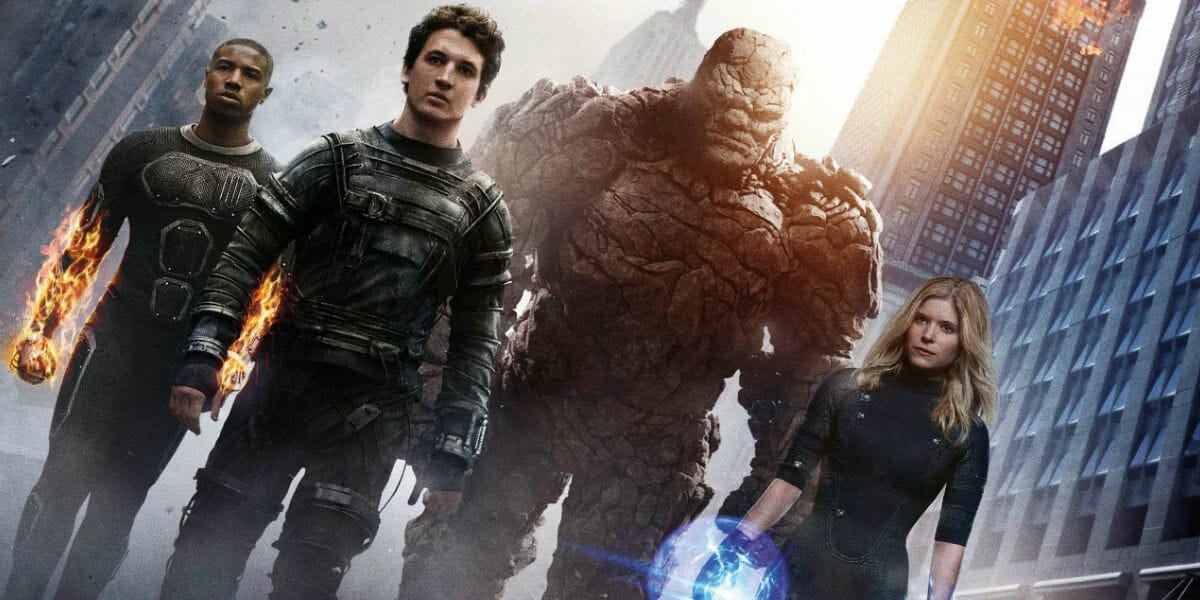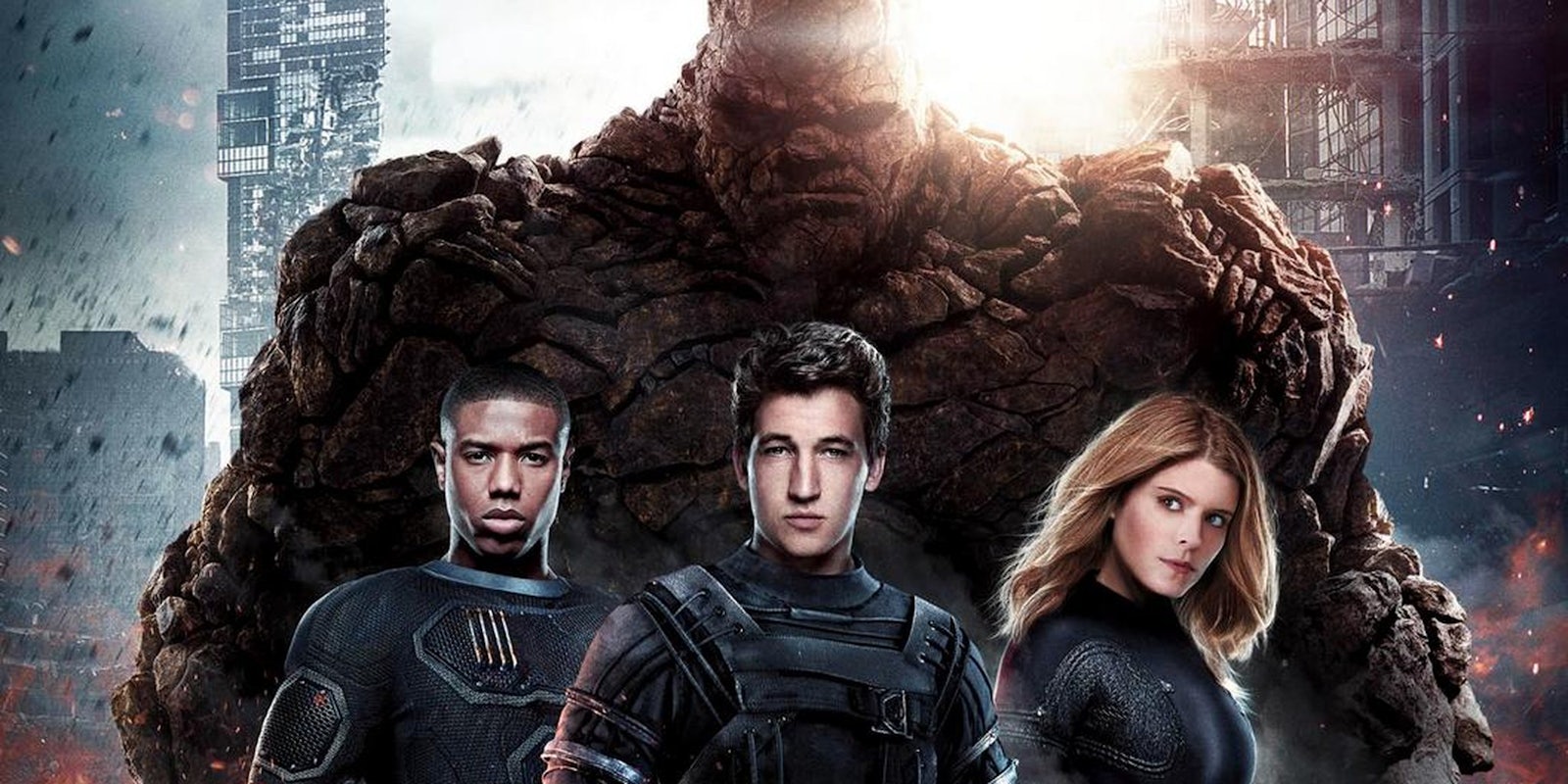When it comes to Josh Trank’s Fantastic Four, one catchphrase comes to mind when it comes to the film’s critical reception: It’s clobberin’ time.
The superhero reboot, which has been torched by critics and comic-book fans alike, has had a rougher time in the press than Dr. Doom had trying to take over the world. Even those who like the movie don’t even really seem that keen on it, often talking about how the film derails about 45 or 50 minutes in. It’s like talking about that person in your group of friends that you don’t really like, but sort of tolerate.
Even with a promising up-and-coming director in Trank and a young but talented cast (including Miles Teller, Kate Mara and Michael B. Jordan), the film almost seemed doomed from the start. No matter how bleak things looked, however, things didn’t get heated until the reviews starting coming in, with the film’s star Miles Teller saying in an interview, “This is not a movie we’re going to go on Rotten Tomatoes and it’s going to be at 80 or 90 percent.”
I’m sure even Teller didn’t expect the film to perform as poorly as it did. Poor Mr. Fantastic himself couldn’t even stretch the rating past 10 percent. For comparison, even the comic-book film that everybody loves to hate—Batman & Robin—has a better rating. Even the original Fantastic Four has a better rating. Hey, at least it has a better rating than Gigli.
So, what went wrong?
3 problems with the Fantastic Four 2015
1) The new movie’s dark and somber tone is wrong for the Fantastic Four.
The road to bringing the Fantastic Four to the big screen has been about as rocky as The Thing from the onset. It started when Tim Story helmed the poorly received Fantastic Four movie in 2005—although let’s not leave out the Roger Corman movie of the mid-90’s that everyone loves to forget. Even though Story’s Fantastic Four movie was only moderately liked by both fans and critics, it received a sequel—a film liked even less.
In an interesting twist of fate, 2005’s Fantastic Four also came out the same year as Christopher Nolan’s Batman Begins. Nolan’s movie had a significant cultural impact on superhero movies and blockbuster movies in general, whereas Tim Story’s Fantastic Four movie was sort of forgotten, placed in a bargain bin at Wal-Mart next to Daredevil and Elektra. In many ways, Nolan’s Batman Begins probably influenced Fox’s new take on the Fantastic Four. In order to separate it from the Story films, the reboot was going to embrace a darker and more grounded aesthetic. If it worked for Batman and the X-Men, surely it could work for the Fantastic Four, right?
Here’s the thing, though: The grounded “realism” angle can work if applied to superheroes that generally warrant that approach. It works for Batman because he’s a vigilante without any superpowers in a crime-ridden city. It even worked for the X-Men—but to understand why it worked requires an understanding that Bryan Singer’s X-Men came out in a time where people didn’t take superheroes on the big screen all that seriously. Even the X-Men franchise saw something of a paradigm shift with X-Men: First Class, which seemed to have blended Singer’s grounded realism with Matthew Vaughn’s sense of fun.
Bottom line, the Fantastic Four isn’t a series that demands the grounded realism approach. More and more superhero movies, especially Marvel, are actually shying away from that formula. Most Marvel fans have been spoiled with Iron Man, The Avengers, and Captain America: The Winter Soldier—movies that balance fun and seriousness in a tasty superhero cocktail.
So, in that sense, this new reboot was facing an uphill battle from the very beginning. It was taking an approach that fans were never going to fully embrace.

2) Fantastic Four is about family. The new movie completely disregards that.
In a lot of ways, Tim Story’s Fantastic Four movie would probably be better received—with a few changes, of course—if it came out today. Despite the film’s many flaws, it embraced the wacky nature of the comics, represented the characters faithfully from a visual and personality standpoint and was true to the spirit of what made the Fantastic Four so endearing in the first place: the sense of family.
After all, the Fantastic Four was created, according to legend, as a response to the Justice League, but what resulted was something completely different. In the comics, the Fantastic Four was the epitome of cheesy science-fiction and over-the-top zaniness, but what made everything matter was the familial dynamics of the main characters. Over the decades, readers could buy into the craziness of the storylines because at the end of the day they were invested in the family dynamic of the characters themselves. As Devin Faraci of Birth Movies Death says, “As a concept the Fantastic Four couldn’t be any more different from the Justice League; instead of disparate solo heroes brought together the Fantastic Four were an ersatz family, united in the moment of their creation.”
The new movie doesn’t care about the Fantastic Four as people and much as it’s interested in portraying them as one-dimensional caricatures. The film midway through jumps so far ahead after the Fantastic Four get their powers that it completely misses the entire point of the movie: to show these characters learning how to hone their powers and learn to appreciate one another. If the film wanted to portray these characters as actual people, it would’ve actually tried to develop the relationships of the main four.
Instead, Trank’s Fantastic Four were merely hollow shells of their comic-book counterparts.
3) The biggest enemy of Fantastic Four is not Dr. Doom: It’s 20th Century Fox
For 20th Century Fox, this is the third time the studio has tried to make a big-screen adaptation out of the famed superhero group—and this is the third failed attempt, too. At some point, someone at the studio needs to wake up and rethink how they are approaching these superheroes, who deserve a much better treatment than they’ve been given.
Unfortunately, Fantastic Four is not a movie deserving this much ire and hate from fans and critics. The first two acts are solid, but the moment the Fantastic Four get their powers, it goes downhill. You can tell there was studio interference and it shows, especially in the climax of the film which is rushed and full of incomplete CGI. You almost want to believe Trank when he says there was a better version of the film a year ago, before the reshoots when the film was likely taken from him.
Trank and his Fantastic Four movie will probably be viewed by most in the industry and elsewhere as an example of what not to do when handling a big budget franchise. Maybe if Trank navigated the studio system better, he could have avoided the machinations of Fox. Or maybe the director and the studio had dissonant visions from the outset. As Trank implies, we’ll likely never know the truth—but you can be guaranteed in the future Trank and other filmmakers will view this situation as something to reflect on, not as a path of success to emulate, but as a path of failure to avoid.
What this means for the future of the Fantastic Four remains uncertain. There are a number of possible outcomes: 20th Century Fox could proceed with the planned sequel (likely without Trank), scrap a sequel altogether, or reboot the property yet again three or five years down the road. If Trank’s Fantastic Four does disappear into the annals of bad film history, Fox might deem the superhero family unfilmable—but any fan of the comics will tell you that’s simply not true. According to Drew McWeeney over at HitFix, Fox still plans to move ahead with a sequel regardless of the lagging box office and critical scorn. “The next filmmaker in is going to start from a difficult position, and they’re going to have to work hard to create their own movie while starting with some of Trank’s choices intact,” he writes.
If that comes to pass, the next filmmaker should have an easier time than Trank did—and if Fox does proceed with a sequel, hopefully it learns from its mistakes, too. Maybe the next film takes a lighter tone and focuses on the family aspect that makes the Fantastic Four what they are in the first place. It also wouldn’t hurt to set the film in the ’60’s, the period in which the Fantastic Four was created in the comics. And maybe it’ll stay a bit truer to the spirit of the comics, rather than trying so hard to be invisible to it. While this particular iteration of the Fantastic Four might have crashed and burned, one thing is certain: They will likely fly again.
Photo via 20th Century Fox


